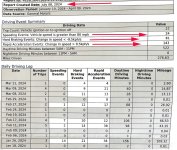teamzr1
Supporting vendor
Be careful what you say in your vehicle as someone could be recording it
Vehicles are getting an “F” in data privacy.
Most major manufacturers admit they are selling your personal information,
a new study finds, with half also saying they would share it with the government or law enforcement without a court order.
The proliferation of sensors in automobiles from telematics to fully digitized control consoles has made them prodigious data-collection hubs.
But drivers are given little or no control over the personal data their vehicles collect, researchers for the nonprofit Mozilla Foundation said Wednesday in their latest “Privacy Not Included” survey Security standards are also vague, a big concern given automakers’ track record of susceptibility to hacking.
“Cars seem to have really flown under the privacy radar, and I’m really hoping that we can help remedy that because they are truly awful,” said Jen Caltrider, the study’s research lead.
“Cars have microphones and people have all kinds of sensitive conversations in them. Cars have cameras that face inward and outward.”
Unless they opt for a used, pre-digital model, car buyers “just don’t have a lot of options,” Caltrider said.
Cars scored worst for privacy among more than a dozen product categories including fitness trackers, reproductive-health apps, smart speakers and other connected home appliances that Mozilla has studied since 2017.
Not one of the 25 car brands whose privacy notices were reviewed chosen for their popularity in Europe and North America met the minimum privacy standards of Mozilla, which promotes open-source, public interest technologies and maintains the Firefox browser.
By contrast, 37% of the mental health apps to non-profit reviewed this year did.
Nineteen automakers say they can & will sell your personal data, their notices reveal.
Half will share your information with government or law enforcement in response to a “request” as opposed to requiring a court order.
Only two Renault and Dacia, which are not sold in North America, offer drivers the option to have their data deleted.
“Increasingly, most cars are wiretaps on wheels,” said Albert Fox Cahn,
a technology and human rights fellow at Harvard's Carr Center for Human Rights Policy.
“The electronics that drivers pay more and more money to install are collecting more and more data on them and their passengers."
“There is something uniquely invasive about transforming the privacy of one’s car into a corporate surveillance space,” he added.
A trade group representing the makers of most cars and light trucks sold in the U.S., the Alliance for Automotive Innovation, took issue with that characterization.
In a letter sent Tuesday to U.S. House and Senate leadership, it said it shares “the goal of protecting the privacy of consumers.”
It called for a federal privacy law, saying a “patchwork of state privacy laws creates confusion among consumers about their privacy rights and makes compliance unnecessarily difficult.”
The absence of such a law lets connected devices and smartphones amass data for tailored ad targeting and other marketing, while also raising the odds of massive information theft through cybersecurity breaches.
The Associated Press asked the Alliance, which has resisted efforts to provide car owners and independent repair shops with access to onboard data, if it supports allowing car buyers to automatically opt out of data collection and granting them the option of having collected data deleted. Spokesman Brian Weiss said that for safety reasons the group “has concerns” about letting customers completely opt out but does endorse giving them greater control over how the data is used in marketing and by third parties.
In a 2020 Pew Research survey, 52% of Americans said they had opted against using a product or service because they were worried about the amount of personal information it would collect about them.
On security, Mozilla's minimum standards include encrypting all personal information on a car.
The researchers said most car brands ignored their emailed questions on the matter, those that did offer partial, unsatisfactory responses.
Japan-based Nissan astounded researchers with the level of honesty and detailed breakdowns of data collection its privacy notice provides, a stark contrast with Big Tech companies such as Facebook or Google.
“Sensitive personal information” collected includes driver's license numbers, immigration status, race, sexual orientation and health diagnoses.
Further, Nissan says it can share “inferences” drawn from the data to create profiles "reflecting the consumer’s preferences, characteristics, psychological trends, predispositions, behavior, attitudes, intelligence, abilities, and aptitudes.”
It was among six car companies that said they could collect “genetic information” or “genetic characteristics," the researchers found.
Nissan also said it collected information on “sexual activity." It didn't explain how.
The all-electric Tesla brand scored high on Mozilla’s “creepiness” index.
If an owner opts out of data collection, Tesla’s privacy notice says the company may not be able to notify drivers “in real time” of issues that could result in “reduced functionality, serious damage, or inoperability.”
Neither Nissan nor Tesla immediately responded to questions about their practices.
Mozilla's Caltrider credited laws like the 27-nation European Union's General Data Protection Regulation and California's Consumer Privacy Act for compelling carmakers to provide existing data collection information.
It's a start, she said, by raising awareness among consumers, just as occurred in the 2010s when a consumer backlash prompted TV makers to offer more alternatives to surveillance-heavy connected displays.
Vehicles are getting an “F” in data privacy.
Most major manufacturers admit they are selling your personal information,
a new study finds, with half also saying they would share it with the government or law enforcement without a court order.
The proliferation of sensors in automobiles from telematics to fully digitized control consoles has made them prodigious data-collection hubs.
But drivers are given little or no control over the personal data their vehicles collect, researchers for the nonprofit Mozilla Foundation said Wednesday in their latest “Privacy Not Included” survey Security standards are also vague, a big concern given automakers’ track record of susceptibility to hacking.
“Cars seem to have really flown under the privacy radar, and I’m really hoping that we can help remedy that because they are truly awful,” said Jen Caltrider, the study’s research lead.
“Cars have microphones and people have all kinds of sensitive conversations in them. Cars have cameras that face inward and outward.”
Unless they opt for a used, pre-digital model, car buyers “just don’t have a lot of options,” Caltrider said.
Cars scored worst for privacy among more than a dozen product categories including fitness trackers, reproductive-health apps, smart speakers and other connected home appliances that Mozilla has studied since 2017.
Not one of the 25 car brands whose privacy notices were reviewed chosen for their popularity in Europe and North America met the minimum privacy standards of Mozilla, which promotes open-source, public interest technologies and maintains the Firefox browser.
By contrast, 37% of the mental health apps to non-profit reviewed this year did.
Nineteen automakers say they can & will sell your personal data, their notices reveal.
Half will share your information with government or law enforcement in response to a “request” as opposed to requiring a court order.
Only two Renault and Dacia, which are not sold in North America, offer drivers the option to have their data deleted.
“Increasingly, most cars are wiretaps on wheels,” said Albert Fox Cahn,
a technology and human rights fellow at Harvard's Carr Center for Human Rights Policy.
“The electronics that drivers pay more and more money to install are collecting more and more data on them and their passengers."
“There is something uniquely invasive about transforming the privacy of one’s car into a corporate surveillance space,” he added.
A trade group representing the makers of most cars and light trucks sold in the U.S., the Alliance for Automotive Innovation, took issue with that characterization.
In a letter sent Tuesday to U.S. House and Senate leadership, it said it shares “the goal of protecting the privacy of consumers.”
It called for a federal privacy law, saying a “patchwork of state privacy laws creates confusion among consumers about their privacy rights and makes compliance unnecessarily difficult.”
The absence of such a law lets connected devices and smartphones amass data for tailored ad targeting and other marketing, while also raising the odds of massive information theft through cybersecurity breaches.
The Associated Press asked the Alliance, which has resisted efforts to provide car owners and independent repair shops with access to onboard data, if it supports allowing car buyers to automatically opt out of data collection and granting them the option of having collected data deleted. Spokesman Brian Weiss said that for safety reasons the group “has concerns” about letting customers completely opt out but does endorse giving them greater control over how the data is used in marketing and by third parties.
In a 2020 Pew Research survey, 52% of Americans said they had opted against using a product or service because they were worried about the amount of personal information it would collect about them.
On security, Mozilla's minimum standards include encrypting all personal information on a car.
The researchers said most car brands ignored their emailed questions on the matter, those that did offer partial, unsatisfactory responses.
Japan-based Nissan astounded researchers with the level of honesty and detailed breakdowns of data collection its privacy notice provides, a stark contrast with Big Tech companies such as Facebook or Google.
“Sensitive personal information” collected includes driver's license numbers, immigration status, race, sexual orientation and health diagnoses.
Further, Nissan says it can share “inferences” drawn from the data to create profiles "reflecting the consumer’s preferences, characteristics, psychological trends, predispositions, behavior, attitudes, intelligence, abilities, and aptitudes.”
It was among six car companies that said they could collect “genetic information” or “genetic characteristics," the researchers found.
Nissan also said it collected information on “sexual activity." It didn't explain how.
The all-electric Tesla brand scored high on Mozilla’s “creepiness” index.
If an owner opts out of data collection, Tesla’s privacy notice says the company may not be able to notify drivers “in real time” of issues that could result in “reduced functionality, serious damage, or inoperability.”
Neither Nissan nor Tesla immediately responded to questions about their practices.
Mozilla's Caltrider credited laws like the 27-nation European Union's General Data Protection Regulation and California's Consumer Privacy Act for compelling carmakers to provide existing data collection information.
It's a start, she said, by raising awareness among consumers, just as occurred in the 2010s when a consumer backlash prompted TV makers to offer more alternatives to surveillance-heavy connected displays.



